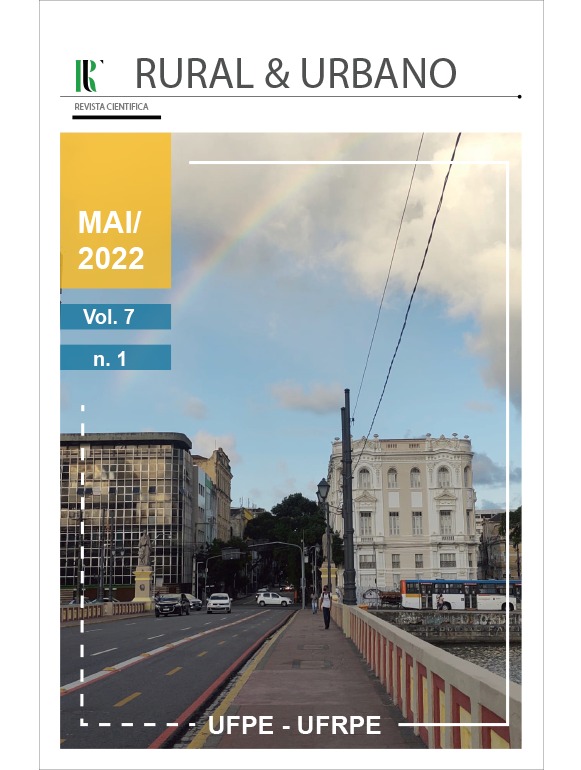Teaching in geography classes involving rural and urban spaces
DOI:
https://doi.org/10.51359/2525-6092.2022.253487Keywords:
didactics; geography; rural; urbanAbstract
The research arises from the intent of practice and discussion among future Geography teachers on how to encompass social and economic interaction, between rural and urban spaces, without distinction. The work begins in the theoretical discussion about therural-urban relationship over time, seeking to present the integration and interdependence between the two spaces. Therefore, the practical part of the work takes place first in the application of a workshop and discussion between undergraduates of the degree in Geography, in October 2019, during the XVIII University Week of the University of Pernambuco –Campus Mata Norte; the second part takes place in December of the same year, in the classroom application of a public school in the city of Carpina-PE,more specifically in a 7th grade class, composed of 30 students. It was possible to perceive that the method of working the experiences lived in the daily life of the students is an attractive way of inducing them to knowledge, even without them realizingit. In addition to working on the association of spaces, the research also portrays the importance of didactics in Geography classes so that students understand their role through the plurality of the current world.
References
BRASIL. Ministério da Educação. Base Nacional Comum Curricular. Brasília: MEC/SEB, 2017.Disponível em:<http://basenacionalcomum.mec.gov.br/images/BNCC_EI_EF_110518_versaofinal_site.pdf>. Acesso em: 09 abr. 2022.
CRUZ, P.M.F. Relação rural-urbana no contexto das novas ruralidades: uma aproximação teórica. In: Encontro nacional da associação nacional de pós-graduação e pesquisa em planejamento urbano e regional, 17, 2019,Natal. Anais[...] Natal: ANPUR, 2019. p. 1-30.
ELIAS, D. Agronegócio globalizado e(re)estruturação urbano-regional. In: Encontro nacional da associação nacional de pós-graduação e pesquisa em planejamento urbano e regional, 15, 2017, São Paulo. Anais [...] São Paulo: ANPUR, 2017. p. 1-16.
FRANCISCO, W.de Ce. "A economia do estado de Pernambuco". Brasil Escola, 2022. Disponível em:<https://brasilescola.uol.com.br/brasil/a-economia-estado-pernambuco.htm>. Acesso em:14 abr.2022.
JOLLIVET, M. Les metamorphoses dun rural incertain. In:M. Jollivet (Org.).Vers un rural postindustrial. Paris: L’ Harmattan, 1997. p. 351-371.
PÉREZ, E.C. Hacia una nueva visión de lo rural. In: GIARRACCA, Norma. (Org.). Una Nueva Ruralidad en América Latina?. Buenos Aires:Asdi/ Clacso, 2001. p.17-30.
PONTE, K.F.(Re) Pensando o Conceito do Rural. Revista NERA. São Paulo,v. 7, n. 4, p. 20–28, jan./jul. 2004.
SILVA, T.T.da. Documentos de identidade:uma introdução às teorias do currículo. 2. ed. Belo Horizonte: Autêntica, 2003.
VIEIRA, E; VOLQUIND, L. Oficinas de ensino:O quê? Por quê? Como?.4ª Ed. Porto Alegre: Edipucrs, 2002.
WIRTH, L. O urbanismo como modo de vida.In:FORTUNA, Carlos(Org.).Cidade, Cultura e Globalização.Oeiras: CeltaEditora,1997. p. 45-66.
Downloads
Published
How to Cite
Issue
Section
License
Copyright (c) 2022 Maria Eduarda Souza Ribeiro

This work is licensed under a Creative Commons Attribution-NonCommercial-ShareAlike 4.0 International License.
Autores que publicam nesta revista concordam com os seguintes termos:
a) Autores mantém os direitos autorais e concedem à revista o direito de primeira publicação, com o trabalho simultaneamente licenciado sob a Creative Commons Atribuição-Não Comercial-Compartilha Igual 4.0 Internacional  , que permite o compartilhamento do trabalho com reconhecimento da autoria e publicação inicial nesta revista.
, que permite o compartilhamento do trabalho com reconhecimento da autoria e publicação inicial nesta revista.
b) Autores têm autorização para assumir contratos adicionais separadamente, para distribuição não-exclusiva da versão do trabalho publicada nesta revista (ex.: publicar em repositório institucional ou como capítulo de livro), com reconhecimento de autoria e publicação inicial nesta revista.
c) Autores têm permissão e são estimulados a publicar e distribuir seu trabalho online (ex.: em repositórios institucionais ou na sua página pessoal) a qualquer ponto antes ou durante o processo editorial, já que isso pode gerar alterações produtivas, bem como aumentar o impacto e a citação do trabalho publicado.

